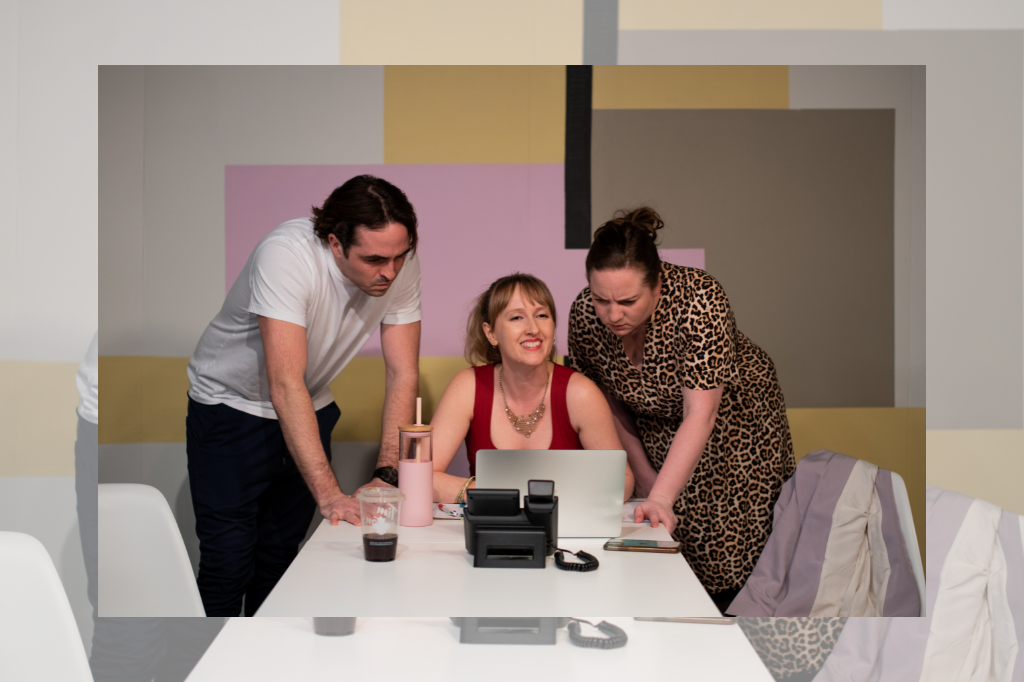REVIEW: The Huns at Assembly Theatre
I was a few minutes late to Assembly Theatre’s charming Parkdale space on opening night of The Huns. Someone brandished a knife on my streetcar en route.
Traffic was also pretty bad. I wasn’t the only person stumbling into the theatre at 8:02.
But mostly, uh, that thing on the streetcar. Yeah. And before digging in here: Thanks to the kind folks at Assembly for holding curtain those extra few minutes. It was appreciated.
That context in mind: It would have taken a small miracle of a play to yank me out of my own high-stakes world and into its own.
The Huns is that miracle.
It’s a scrappy production, this hot-headed three-hander set inside some unnamed corporate hell. Biting at the heels of Assembly’s Two Minutes to Midnight, the set’s a little less glamorous (laminate flooring is suggested by a tiny vinyl sample downstage), the scenario’s a little less dire (set in a crumbling office rather than an ending world), and the relationships between characters are a little less comprehensible.
But Michael Ross Albert is quickly becoming a new favourite playwright for me — his intoxicating, deceptively simple writing lures you in, seducing you with its antics and stylistic verve, eschewing the need for flashy sets or spaces. The Huns is no Office spin-off, no Succession-style power struggle. Set in a head office for a tech company, The Huns is really two plays: The How Have We Been On Zoom For Two Years Play and the What The Ever-Loving Hell Is Happening Now Play. And to be clear: Albert’s text isn’t in reaction to the pandemic. It premiered at the Toronto Fringe in 2019. But there appears to have been some almost otherworldly foresight at play — the text grabs hard at our COVID context, and that resonance never feels forced.
We follow executive Iris (a bracing Breanna Dillon) as she tries valiantly to deliver a presentation using a phone-conferencing program — it’s functionally a stand-in for Zoom, complete with inept co-workers who for the love of all that is holy just cannot seem to find their mute button. The call goes poorly; assistant (or is she?) Shelley, the lovely and assertive Cass Van Wyck, makes bold attempts to wrangle the meeting into something resembling pleasant; employee Pete, the well-timed and precise Jamie Cavanagh, reminds us (and then reminds us again) he has a flight to catch for his bachelor party.
And then shit hits the fan. Fast.
Albert’s characters are much more complex than they might appear. Dillon’s Iris is prone to yelling, scream-speaking when talking doesn’t go her way. Van Wyck’s Shelley has the same tendency, though the yelling there feels more at odds with her otherwise soft-spoken character. And yet Iris (almost) becomes sympathetic by The Huns’ conclusion — Dillon’s got a Herculean task here, finding subtlety in a character who sees no use for it. She finds a Wambsgans heart in a Roy beast of a workplace (sorry, another Succession reference), and it’s extremely effective.
If Albert had a favourite character when writing The Huns, he doesn’t show us here: They’re all written superbly well.
Shelley’s no doormat of an intern, and Pete, though prone to douchebaggery, has some layers, too — his consistent defense of Shelley in the first half of The Huns offers glorious returns in the play’s final few moments. It’s worth driving home how remarkable Van Wyck’s performance is knowing she just finished her lead role in Two Minutes to Midnight while also co-running Assembly and her own indie company, OneFourOne — Huns’ Shelley and Midnight’s Tracy are vastly different characters, and Van Wyck’s fleshed them both out well.
The Huns offers three solid performances of characters who act on the impulses we’ve all suppressed these past few years — wouldn’t you relish screeching like a banshee at that one coworker who won’t mute themselves? And if you’re feeling lost in the labyrinth of your career and the consequences of your bad choices — wouldn’t you lose a limb to articulate, for once, just how much life as a corporate under-40 completely and utterly sucks?
Audience reactions on opening night reached the outer extremes of generally-accepted theatre etiquette. There were more than a few yelps of secondhand cringe, of “oh boy”s, of laughs which had entire rows of Assembly spectators wheezing for air. Director Marie Farsi has shaped Albert’s text with a heavy hand, wringing high-drama moments from every monologue, every hurled insult. And yet she too has found the subtext, and she’s been smart not to linger on it too long: The Huns opens itself up to discourse on substance use, suicide, and depression, and while remaining a high-flying comedy it navigates these topics deftly. Andy Trithardt’s sound design, too, is modest about its sheer craft — pre-recorded phone call voices are impeccably timed and edited, with no feedback to be heard.
The Huns heads to the UK on tour soon, and I hope it finds success there. The play has so much to say about the ridiculousness of being alive during These Strange Times™ (witnessing a stabbing on the TTC en route to a reviewing gig would in no way be out of place in Van Wyck’s powerful second-half monologue), and regardless of locale, the Zoom call from hell and its disastrous, hilarious echo are sure to hit audiences hard.
The Huns runs at Assembly Theatre through May 8. Tickets are available here.















Comments